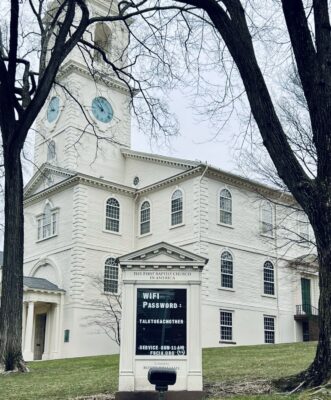
By Linda Hart Green
This is the current signboard in front of the First Baptist Church in America in Providence, Rhode Island, founded in 1638.
1638!
My colleague and friend, The Rev. Dr. Jamie Washam, is the current pastor, who is following in a long line of illustrious and inspiring preachers and, dare I say, rabble-rousers.
In addition to the large, central pulpit inside the meeting house, she has a “wayside pulpit” on which to offer catchy, thought-provoking messages to the community. She takes this job seriously but also has fun with it.
There are lots of passers-by because the church is located on North Main Street, between Brown University and Rhode Island School of Design. It grew from tiny structures to the historic building it is today, with a 185-foot spire.
The founder of this church and of Providence itself was Roger Williams. Since my ordination is through the American Baptist Churches, USA, knowing his legacy was part of my training. Seeing a photo of this church recently prompted me to reflect on the importance of what it has stood for since the 17th century, a stance that remains crucial today.
Rev. Williams was a graduate of Cambridge and an ordained minister when he came to the Colonies in 1631. He was a “Separatist” from the Church of England and was branded a troublemaker. He fled to the Colonies. Williams found the religious atmosphere of the Massachusetts Bay Colony just as stifling as that of the Church of England. He was persecuted there, too.
He moved to the settlement of Puritans in Plymouth, Massachusetts for several years, because those worshippers had cut ties to the Church of England. He then went to be the pastor of a group in Salem, Massachusetts until his radical views made him fearful of being extradited for trial back in England.
What did he believe that was radical enough to warrant these actions?
He preached that each person has “soul liberty,” which rejects the notion that the government has any authority to intervene in matters of religion or conscience. He believed in a complete separation of church and state because “the church is founded on the love of God and the state is founded on the sword.” He also preached that the king had no authority to give land grants to settlers when compensation was not paid to the native peoples to whom the land belonged.
He was friends with and traded with chiefs of the Narragansett nation. He purchased land from them for a settlement and called it “Providence” because its mission was to be “a place for persons of distressed conscience.”
He was the pastor there for a brief time, but his legacy of beliefs left its stamp on the congregation, the city, the state and the nation. Subsequent Baptist leaders took up the mantle of religious liberty and greatly influenced the framers of the U.S. Constitution so that both freedom of religion and freedom from religion are protected in the First Amendment.
Soul liberty is summed up by this phrase: II you cannot say “no” to religion, your “yes” is meaningless. God does not coerce faith. God allows for free will, since we are created in God’s own image. Government should not try to do what God will not do.
There are so many varieties of Baptist now, these founding concepts have gotten obscured through the years and through accommodation to culture and traditions.
Because Baptists of every stripe are plentiful throughout the South, it would be easy to assume Baptists got their start here rather than in New England. In fact, the Southern Baptist denomination was born out of a meeting in this Rhode Island church when the gathered body refused to commission missionaries supported by slave-holding states.
The Baptists from Southern states withdrew and formed their own organization in 1845.
When we think of what it means to defend freedom today in our community and in our state, we would do well to recall the brave settlers who left their homeland in England in search of freedom from an oppressive religious regime enforced from and married to a throne.

Sounds like we could use a Roger Williams in our times. IMHO, religion is like medicine: certain types are good for certain people for certain times in their lives. No one religion is good for everybody all the time, and people who were cured of whatever it was ailing them by whatever religion they were using at the time, should get past their religion and get healthy again. Continuing to use religion when the ailment has been cured is dangerous for the person. Also, a religion is merely a philosophy, a worldview of life, and there really is nothing sacred about it. People sometimes get so tied to their religion that they can’t even laugh about it or have doubts about it, both dangerous places to be in.
Thanks for your always thoughtful comments. Mark. Religion is one thing. An encounter with the living presence of the holy is another. Doubting and laughing and questioning are important parts of spiritual maturity.